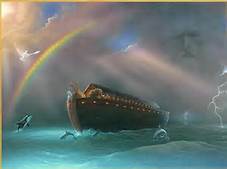
.
.
Was there enough room on Noah's Ark to fit Noah and his family (eight all together), at least two of every kind of animal, and seven of some?
Was there enough room on Noah's Ark to fit Noah and his family (eight all together), at least two of every kind of animal, and seven of some?
What about essential supplies?
According to the Biblical account, the Great Flood lasted an entire year!
So besides the people and all the animals, there had to be at least enough room to store the necessary amount of food to sustain Noah's family and all the animals for more than twelve months!
Exactly how big was that boat?
We will examine the Biblical account of the Flood as found in Genesis (chapters six through nine) to determine if Noah's Ark is a feasible reality or merely a fantastic part of ancient myth.
 The AnimalsIn order to determine if Noah's Ark could have been large enough to save the world's human and animal population from a worldwide marine cataclysm we must first determine how many animals must have been on the boat.
The AnimalsIn order to determine if Noah's Ark could have been large enough to save the world's human and animal population from a worldwide marine cataclysm we must first determine how many animals must have been on the boat.
So, what kind of animals needed rescuing? According to most scholars, the Genesis account excludes sea creatures and insects from being loaded on the ark.
This seems reasonable, since remnants of each of these creatures could have survived the cataclysm apart from the ark. That leaves mammals, birds, reptiles, amphibians and Noah's family.
Next, we must consider that God instructed Noah to bring animals on the ark "after their kind." This means we should appreciate the scientific concept of variations within a Kind.
 For example, most biologists agree that wolves, coyotes, dingoes, jackals, foxes, and the hundreds of different domestic dog breeds could all come from a pair of original "dogs."
For example, most biologists agree that wolves, coyotes, dingoes, jackals, foxes, and the hundreds of different domestic dog breeds could all come from a pair of original "dogs."
Although genetic code won't allow for variations from Kind to Kind, we now understand how DNA allows for variations within a Kind.
Taking such variations into consideration, there are roughly 16,000 to 25,000 distinct Kinds of mammals, birds, reptiles and amphibians now living or known to have lived in the past.
 Noah's Ark - A Feasibility StudyWhat about Noah's Ark itself? Was the design and size of this boat really feasible?
Noah's Ark - A Feasibility StudyWhat about Noah's Ark itself? Was the design and size of this boat really feasible?
Based on measurements given in the Genesis account, most experts agree that the ark had approximately 1,500,000 cubic feet of free space.
Picture a three-level barge the size of one-and-a-half football fields.
According to numerous feasibility studies, this was more than enough room to keep representatives of the 16,000 to 25,000 distinct Kinds of animals of all sizes with all of their food for an entire year.
In fact, assuming that the average size of each animal was that of a sheep, this barge could actually hold up to 125,000 separate creatures.
 Going one step further, not only was the ark large enough for its cargo, it was designed perfectly for stability and sea-worthiness.
Going one step further, not only was the ark large enough for its cargo, it was designed perfectly for stability and sea-worthiness.
Various hydrodynamic tests have confirmed that it was virtually impossible to capsize this barge, even in the most violent waves and winds.
The Recent CriticsIn recent years, critics of Noah's Ark have surfaced and posed many seemingly reasonable and intellectual questions casting doubt on the validity of the Biblical account of the Flood.
 Often, conservative Bible scholars remain silent on these questions because they are somewhat intimidated by the "scientific" posture of the anti-ark arguments.
Often, conservative Bible scholars remain silent on these questions because they are somewhat intimidated by the "scientific" posture of the anti-ark arguments.
At the same time, the more liberal Bible scholars simply roll over and quietly accept the "myth" of Noah's Ark and the Flood.
We urge everyone to examine all of the critical evidence and truly discover the credibility of Noah's Ark.
Pick up John Woodmorappe's, Noah's Ark: A Feasibility Study, and Dr. Henry Morris' classic, The Genesis Flood, and investigate the focused and systematic research available to all of us, including nearly 1,200 references to aid in additional study.
We soon realize that the vast majority of the popular anti-ark arguments are easily invalidated. Test everything yourself.
Never be content with a one-sided argument, especially one that pales in comparison to its rebuttal.


No comments:
Post a Comment